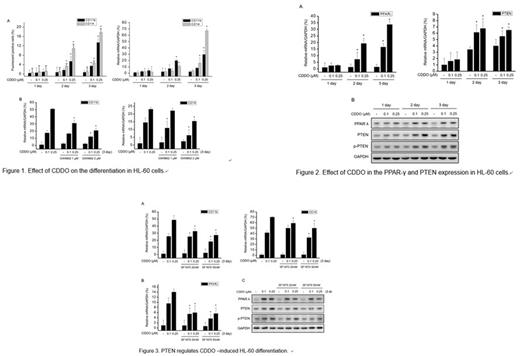Abstract
Acute promyelocytic leukemia (APL) represents a group of haematological malignancies characterized by blocked differentiation. Cell differentiation has been as a strong target of treatment of APL. Peroxisome proliferator-activated receptors gamma (PPAR-γ) play an important role in the differentiation of APL cell lines. Previous study has shown that PPAR-γ ligands induce neutrophil/ monocytic differentiation in human acute promyelocytic leukemia HL-60 cells. It has recently been shown that the novel synthetic triterpenoid 2-cyano-3,12-dioxooleana-1,9-dien-28-oic acid (CDDO) induces differentiation in leukemia HL-60 cells. In this study we established a CDDO-induced differentiation model for the treatment of APL. We evaluated for the surface antigen expression associated with myeloid maturation, CD11b and CD14 by flow cytometric analysis and RT-PCR. We demonstrated that CD11b and CD14 increased as CDDO -induced differentiation. In addition, CDDO induced a HL-60 differentiation through the regulation of PTEN expression. PTEN also has various cellular function such as cell differentiation. PPAR-γ could synergistically up-regulate PTEN in human leukemia cells and consequently stimulate the differentiation of these cells We confirmed that suppression of PTEN with the inhibitor (SF1760) caused reduction of differentiated HL-60 cells. Our results suggest PPAR-γ an important role in controlling the differentiation of leukemia cells via the regulation of PTEN.
Disclosures
No relevant conflicts of interest to declare.
Author notes
Asterisk with author names denotes non-ASH members.


This feature is available to Subscribers Only
Sign In or Create an Account Close Modal